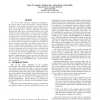Free Online Productivity Tools
i2Speak
i2Symbol
i2OCR
iTex2Img
iWeb2Print
iWeb2Shot
i2Type
iPdf2Split
iPdf2Merge
i2Bopomofo
i2Arabic
i2Style
i2Image
i2PDF
iLatex2Rtf
Sci2ools
125
click to vote
ASPLOS
2000
ACM
2000
ACM
Power Aware Page Allocation
One of the major challenges of post-PC computing is the need to reduce energy consumption, thereby extending the lifetime of the batteries that power these mobile devices. Memory is a particularly important target for e orts to improve energy e ciency. Memory technology is becoming available that o ers power management features such as the ability to put individual chips in any one of several di erent power modes. In this paper we explore the interaction of page placement with static and dynamic hardware policies to exploit these emerging hardware features. In particular, we consider page allocation policies that can be employed by an informed operating system to complement the hardware power management strategies. We perform experiments using two complementary simulation environments: a tracedriven simulator with workload traces that are representative of mobile computing and an execution-driven simulator with a detailed processor memory model and a more memoryintensive set of benchm...
Related Content
| Added | 01 Aug 2010 |
| Updated | 01 Aug 2010 |
| Type | Conference |
| Year | 2000 |
| Where | ASPLOS |
| Authors | Alvin R. Lebeck, Xiaobo Fan, Heng Zeng, Carla Schlatter Ellis |
Comments (0)

